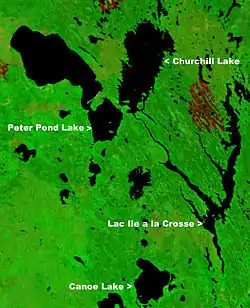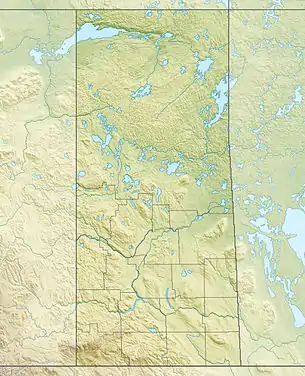Lac Île-à-la-Crosse
Lac Île-à-la-Crosse is a lake in North-Central Saskatchewan, Canada on the Churchill River. It is basically Y-shaped. At the center of the Y is the town of Île-à-la-Crosse, the second oldest town in Saskatchewan. The Churchill exits the northeast arm and flows east to Hudson Bay through a series of lakes. The Churchill enters at the northwest arm called Aubichon Arm or Deep River. Upstream it leads northwest to Athabasca Country passing Churchill Lake, Peter Pond Lake, Lac La Loche and on to the Methye Portage leading to Lake Athabasca.
| Lac Île-à-la-Crosse | |
|---|---|
 | |
 Lac Île-à-la-Crosse | |
| Location | Saskatchewan |
| Coordinates | 55°26′40″N 107°50′55″W |
| Lake type | glacial lake |
| Primary inflows | Churchill Lake by Aubichon Arm or Deep River, Beaver River |
| Primary outflows | Churchill River |
| Catchment area | Churchill River |
| Basin countries | Canada |
| Islands | Big Island |
| Settlements | Île-à-la-Crosse , Patuanak is near the north end on the Churchill. |
The Beaver River comes from the south and west and enters on the east side. The headwaters of the Beaver are southwest between the upper Athabasca River and the upper North Saskatchewan River in the Lac la Biche area in Alberta. Lac Île-à-la-Crosse is reached from the south by Saskatchewan Highway 155 which follows the Beaver River. To the southeast is Lac la Plonge and to the southwest Canoe Lake. To the east are many lakes which are widenings of the Churchill.[2][3]
Fur trade posts
.jpg.webp)

Given its strategic location it was a natural stop for the fur trade. See Canadian canoe routes (early). Once the trade developed pemmican was carried up the Beaver from the buffalo country on the North Saskatchewan. In 1767 Louis Primeau, in the service of the Hudson's Bay Company, was reported on the Beaver River which means he must have passed through the lake. In 1776 Primeau, working for Thomas Frobisher of Montreal, built a post on the lake.[4]
In 1776-77, Peter Pond wintered here as did Thomas Frobisher. Around 1786, Scottish explorer Alexander Mackenzie, working for Gregory&McLeod, competed with Patrick Small of the NWC.[4] In 1787 William McGillivray was a clerk here. In 1782-85 there were three groups of independent traders, but by 1789 they were consolidated into the Northwest Company. Around 1790 McGillivray managed the Churchill River Department of the NWC from here. Here in 1799 David Thompson (explorer) married a thirteen or fourteen-year-old Métis daughter of Patrick Small. Unlike most "country marriages" this lasted until his death.[5]
William Linklater of the HBC built a post in 1799. Peter Skene Ogden and Samuel Black of the NWC harassed it. In the spring of 1811 Peter Fidler (explorer) was forced to abandon it and the Nor'westers burnt it to the ground. In 1814 the HBC built a new post at a different location. In 1817 or 1818 the NWC built a fence around it. The HBC built a third time and called their post Fort Superior. The two companies were merged in 1821. By around 1980 there was still an HBC warehouse. Most of the posts were located near the town of Île-à-la-Crosse, but either the Northwest Company or the XY Company seems to have had a place on the west side of the mouth of the Beaver River.[4][6]
References
- "NASA Visible Earth (BURN SCARS IN SASKATCHEWAN, CANADA) Note: Dark to light rust coloured areas are burn scars from forest fires". August 24, 2002. Retrieved 2014-09-14.
- "Natural Resources Canada-Canadian Geographical Names (Lac Île-à-la-Crosse)". Retrieved 2014-08-29.
- "Atlas of Canada Toporama". Retrieved 2014-08-29.
- Marchildon, Greg; Sid Robinson (2002). Canoeing the Churchill: A Practical Guide to the Historic Voyageur Highway. Regina: University of Regina. pp. 144–148. ISBN 0-88977-148-0.
- Thompson, David. "Dictionary of Canadian Biography". Retrieved 2013-12-22.
- "ENCYCLOPEDIA OF SASKATCHEWAN (list of forts in Northern Saskatchewan)". Retrieved 2013-12-22.